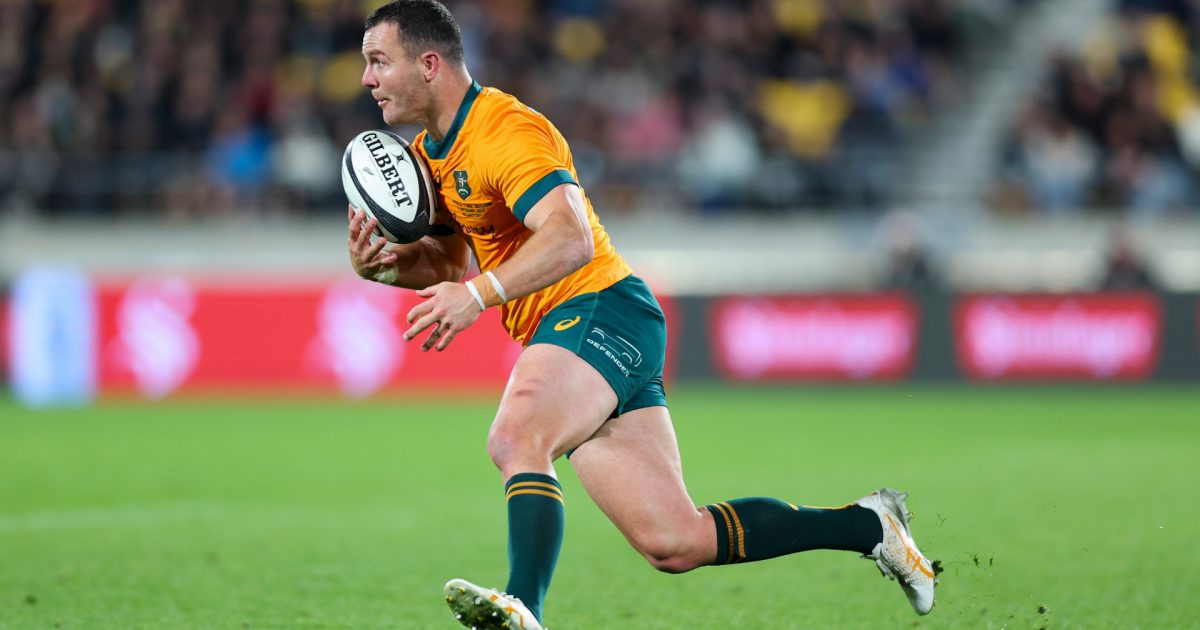Former flanker turned Olympian compared to legendary Wallabies winger

Dual international Marika Koroibete is one of the greatest wingers to have ever worn the famed gold jersey of the Wallabies. David Campese, Lote Tuqiri and Drew Mitchell are also in that discussion, but Koroibete was twice named the Wallabies’ best player.
Backrower George Smith was awarded the inaugural John Eales Medal in 2022. Smith, Michael Hooper, Israel Folau, Nathan Sharpe and David Pocock are the only other multi-time winners in the history of the award, of which Koroibete is the only out-and-out winger.
Koroibete has come under fire as of late following a poor run of performances in Wallaby gold since returning to the national setup ahead of The Rugby Championship. The 32-year-old was injured during Bledisloe I in Sydney and ended up missing the next Test in Wellington.
That injury to Koroibete, as well as an illness to Max Jorgensen which saw the rising star return home to Australia early in the Test week, opened the door for Dylan Pietsch to start in Wallaby gold for the first time.
Back in high school, Pietsch was selected in the 2016 Australian Schools Barbarians side after his second season in the King’s School First XV. But, interestingly, the future Wallaby was a backrower before making the shift to wing later in his career.
But, Pietsch started in the Wallabies’ No. 11 jumper for the first time last weekend and the speedster was quite solid on the left edge. Former Wallaby Stephen Hoiles has highlighted “physicality” as a trait Pietsch shares with Koroibete.
“Marika is a very difficult guy to compare to,” Hoiles said on Stan Sports’ Between Two Posts.
“I think his physicality is very similar, he’s not yet learnt the art of the multiple touches in a game but not many wingers have – that’s Marika’s superpower – not just his quality but his quantity of work because he goes and gets it.
“That’s what’s been so good for us.”
Four-time John Eales medallist Michael Hooper added: “Pietschy is a seven, he was a seven back in the day. He did play sevens as well but he was a number seven… he got a steal there in NZ. He’s good.
“It is a great story, Pietschy. He sat in front of us at the Waratahs, this might have been two years ago now, and his dream was just to play for Australia. It was just what he talked about and he’s gone and he’s done that.
“It’s really lovely to see someone when they set a goal like that, and he puts it out there to the team at the time, and it’s a tough spot to get in (as) an Australian winger and he’s managed to do it.
“Really cool and happy for him and his crew.”
The journey from high school backrower to Wallabies winger isn’t a transition that happens overnight. Pietsch joined the Australian Men’s Sevens program right out of school and went on to debut on the international circuit in Wellington during the 2016/17 season.
Pitsch battled some mental health challenges, as the panel on Stan Sport briefly discussed, but later returned to rugby in time to make Team Australia’s squad for the Tokyo Olympics. After signing with the Waratahs, the now 26-year-old continued to chase his Wallabies dream.
Eddie Jones selected Pietsch in the Wallabies’ Rugby Championship squad last year.
While his Test debut didn’t come that year, it was right around the corner. New coach, Joe Schmidt, selected the Western Force-bound flyer to come off the bench during the Wallabies’ first win over Wales in July.
“He went to boarding school quite young… went to Kings and then came out of that and pretty much went straight into the sevens program.
“It’s always difficult for young guys leaving school because you’re sent into a program and you’re essentially asked to act the same as the guy next to you who is 30-years-old and he put a lot of pressure on himself.
“Sevens, there’s so many good things about being in the sevens squad… but it’s hard because if you miss selection on this tournament, you’ve got to wait six weeks to go and get the next one.
“You can end up going three or four months without playing much football and as a young guy, that’s what you love.
“I remember one day in Canada, he came on day two, didn’t get used on day one and scored like 11 tries in three games. He just has that exceptional ability to do things.”



























